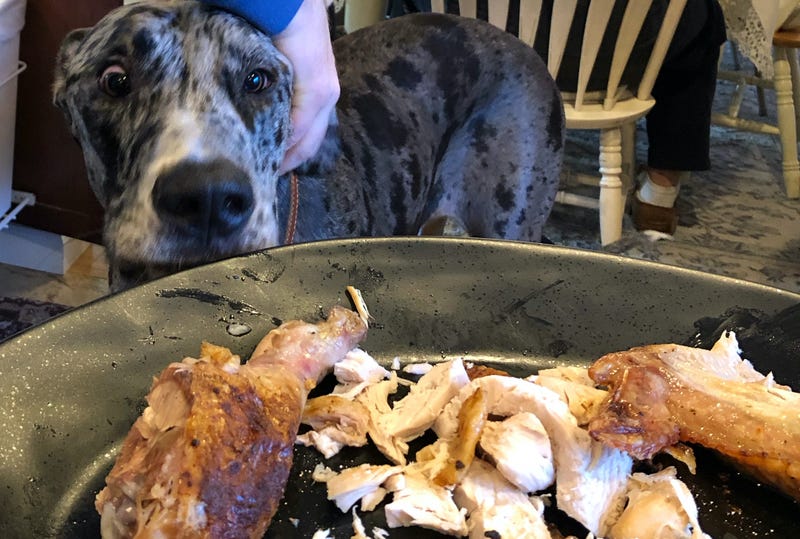
PHILADELPHIA (KYW) — It’s a joyous time when family members get together for the holidays. And while the turkey scent wafts from the table above, your loveable pooch is more than likely right by your side, savoring the scents of holiday seasonings. What you do next though, could make or break your pet's holiday.
We’re all guilty of sneaking a piece of turkey or ham to our pets, and they of course love it. But pet health experts say it’s important to remember the potential hazards that come with holiday get-togethers.

Some of these may come off as common-sense reminders, but they are reminders nonetheless.
Turkey dos and dont's
White turkey meat with none of the fixings is usually OK for pets, but make sure your pet doesn’t get into the turkey carcass - like bones, strings or other garbage.
Speaking of things your pet shouldn’t eat: turkey skin. There are plenty of turkey-based pet foods on the market, but dogs shouldn’t have turkey skin or dark meat, according to Heart + Paw veterinary services.
Turkey skin is very high in fat, which makes it hard for some dogs to digest, even in small amounts.
Other foods that you’ll often cook with, like garlic or onions, are also toxic to dogs, so be mindful of the ingredients before giving a sample to your resident taste-tester.
If you just can't stand the pleading eyes, consider making your dog its own feast. Skinless and plain chicken breast is always a safe option, along with steamed sweet potatoes and carrots. All are safe and healthy options.
Watch that counter!
You don’t want any jumpin’ Jack Russells hopping onto the counter for tasty scraps - an accidentally making a mess of your kitchen or themselves. Keep your pets clear of clutter by keeping them elsewhere during meal prep - and make sure to tighten the lid on the trash can so they don't do any sneaking.
Also keep an eye on any chocolate, sweet desserts - which could cause a majorly upset pet belly.
Seasonal plants
Fall plants add a pop of color to the festivities, but some are extremely toxic if ingested by cats and dogs.
Poinsettias: For their beautiful red leaves, Poinsettia plants are the number one decor item on most lists. But if you have pets - you may want to consider buying fake ones.
"The poinsettia plant’s brightly colored leaves contain a sap that is irritating to the tissues of the mouth and esophagus," according to Pet MD, and if the leaves are eaten, it could cause some nausea and vomiting.
Holly & Mistletoe: These plants are more toxic than Poinsettias, and could upset the intestines of pets - leading to "vomiting and diarrhea, excessive drooling and abdominal pain" Pet MD says.
Christmas Tree: Unfortunately yes, this one is also a danger to pets. Beyond electric powered lights and breakable ornaments, the trees also produce oil that can irritate a pet's mouth and stomach, Pet MD says. Those needles are also sharp - and could block intestines if eaten.
To play it safe, go for artificial plants this holiday season - or keep those festive plants in places where pets won't be able to get to them.
Check the ASPCA’s lists of toxic plants for dogs and cats. If anything food or plant related, you can always call the ASPCA Animal Poison Control Center at 888-426-4435.
